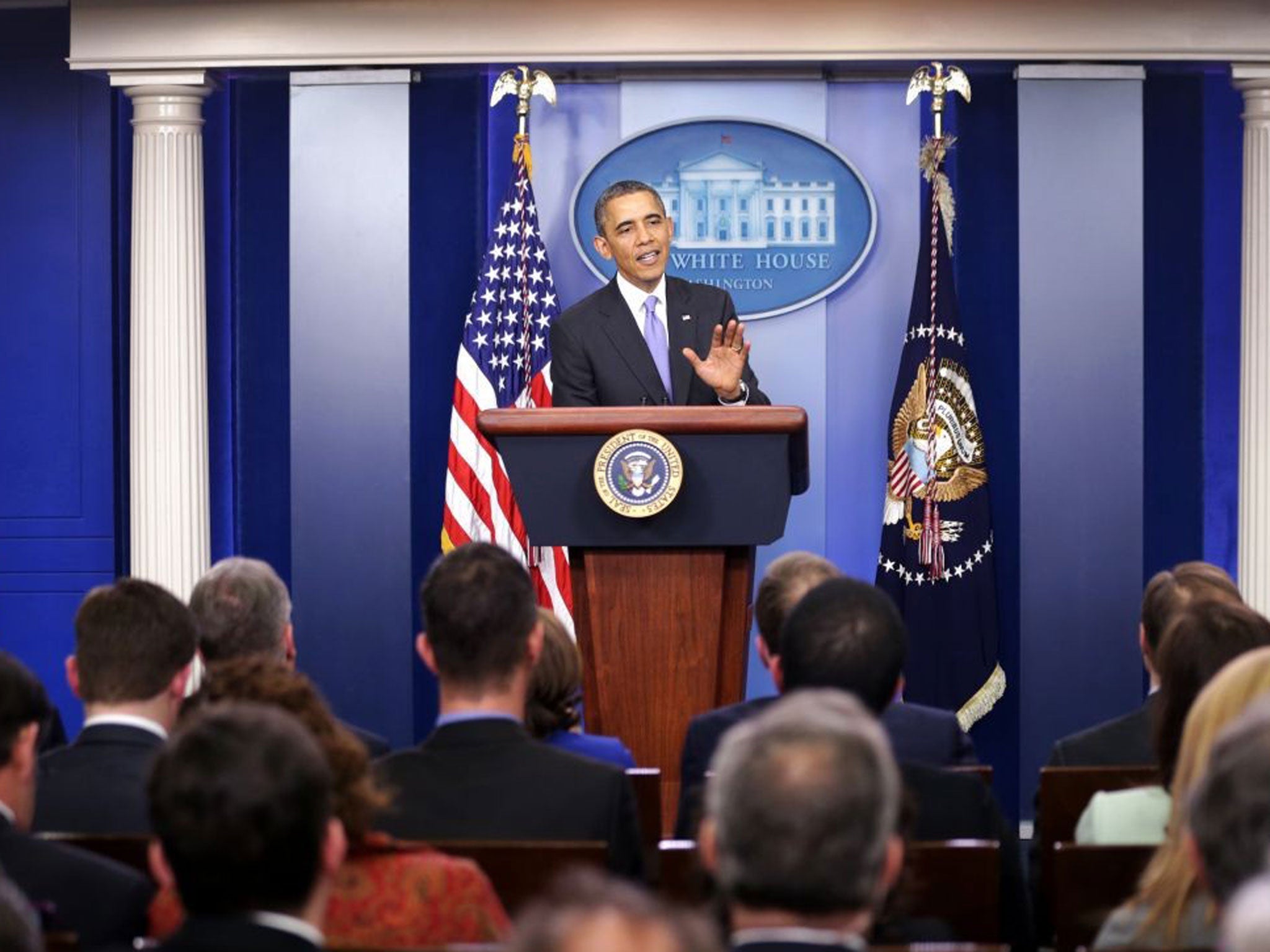Barack Obama puts his 'annus horribilis' on hold
Edward Snowden's revelations about the NSA have wounded the President almost as much as the disastrous roll-out of his healthcare reform


For national leaders, there's no such thing as a real holiday – and so it will be for Barack Obama as he and his family start their habitual Christmas and New Year break in his native Hawaii. "A couple of days of sleep and sun," to borrow his words from his end-of-year press conference on Friday, will doubtless dull the pain of what has been, by common consent, the annus horribilis of his presidency. But on the beaches and fairways of Oahu, will he find a way to bring the National Security Agency to heel?
For one thing is crystal clear at the end of 2013, or more accurately the Year of Edward Snowden. More than six months after the former US national intelligence flunkey delivered one of the largest national security leaks in American history, the controversy isn't going away. And that means something has to give at an NSA run amok.
That of course, wasn't what Obama wanted. He might have won office as the anti-George W Bush, by criticising his Republican predecessor's national security policies, from the Iraq war to the prison at Guantanamo Bay and the surveillance excesses effectively given free rein by the Patriot Act.
In office, though, it's been a different story. The US is out of Iraq, to be sure, and black prisons and waterboarding are no longer part of the CIA's box of tricks. But Guantanamo is still open. And had not Snowden spilled the beans, the quite breathtaking scale of the NSA's electronic snooping on American and foreign citizens alike would probably have stayed a secret.
Snowden's revelations have wounded Obama, almost as much as the simultaneous, and disastrous, roll-out of his healthcare reform. Just as his false claim that everyone would be able to keep their existing health insurance plans if they liked them, so his and his officials' repeated – and equally false – assurances that the NSA was up to no mischief, have damaged Obama's credibility. And, as Bush would be first to agree, when people don't believe what a president says, he's in big trouble.
In politics of course, cynicism is often not misplaced. Quite possibly, once the Snowden hubbub has subsided, nothing will really change. We will hear soothing assurances by the score, but the NSA may quickly revert to business as usual. After all, is not the first law of intelligence agencies that if they can do something, they will? But after the events of the past few days, I'm not so sure.
Basically, three things have happened. First, a federal judge took aim at the agency's vacuuming of the phone records of virtually every American. Richard Leon may have been appointed to the DC bench by Bush. But that didn't stop him declaring the programme unconstitutional and "near-Orwellian", one which would have left the Founding Fathers "aghast". The legality of the NSA's behaviour may or may not be upheld. Whatever happens however, the Supreme Court will almost certainly make the final decision; that alone ensures the matter will not quickly go away.
No less important, parts of all three branches of government are now ranged against the agency. A couple of days after the Leon broadside, an independent White House panel weighed in, in similar vein. Many of its 46 recommendations are pretty woolly, and Obama is not bound to accept any of them. But overall, they send the same message.
Yes, the panel says, there is no evidence of specific individual cases of abuse by the NSA – but equally none of specific plots, terrorist or otherwise, that have been thwarted by the agency's work. On balance, the relentless gathering of "meta-data", containing numbers and times of Americans' phone calls (though, we are assured, not their contents), is a threat to personal freedom and, the panel argues, should be banned.

There should be more protection of foreign calls made by US citizens, while the secret court that grants NSA surveillance requests should not be a rubber stamp (as it is now) but hold genuinely adversarial hearings. Finally, the telecom and tech companies that have hitherto allowed the NSA to snoop in total silence, should be permitted to provide at least general information about what the government is asking them to do.
In Congress, meanwhile, the legislative branch is finally showing some teeth, having for years acquiesced in the lies proffered by America's government cyberwarriors on the rare occasions they are summoned to testify on the Hill. And even then, of course, the House and Senate intelligence committees were sworn to secrecy, rendering the process virtually pointless. Today Snowden isn't exactly a national hero – but no longer is he seen simply as a dastardly traitor, either. The sympathy is bipartisan, stretching from liberal Democrats fearful for civil liberties to the noisy libertarian Republicans.
Most dangerous, though, is the potential commercial fall-out. It's not so much the damage to US prestige caused by the NSA eavesdropping of leaders of Germany, Brazil and other friendly countries; like it or not, that's what spying's always been about. The scandal is now starting to hit where it hurts most: in the pocket.
US companies such as Apple, Google and Facebook dominate world markets, but the NSA taint is starting to erode trust in the integrity of their products. Earlier this month several of them, normally so ferociously competitive, issued a joint open letter warning of the risks to individual freedoms. A few days ago, a group of their top tech-company executives met Obama at the White House. The talk was supposed to be about righting the healthcare mess. Instead, the word afterwards was, it was all about the NSA.
And small wonder. Last week Brazil switched its $4.5bn fighter jet order from Boeing to Sweden's Saab, almost certainly thanks to the scandal. Tens of billions of dollars of foreign data processing orders are also at risk, industry spokesmen say. On Friday Obama promised that, once back from his balmy Hawaiian break in January, he would make a "pretty definitive" statement about the NSA. It needs to be.

Join our commenting forum
Join thought-provoking conversations, follow other Independent readers and see their replies